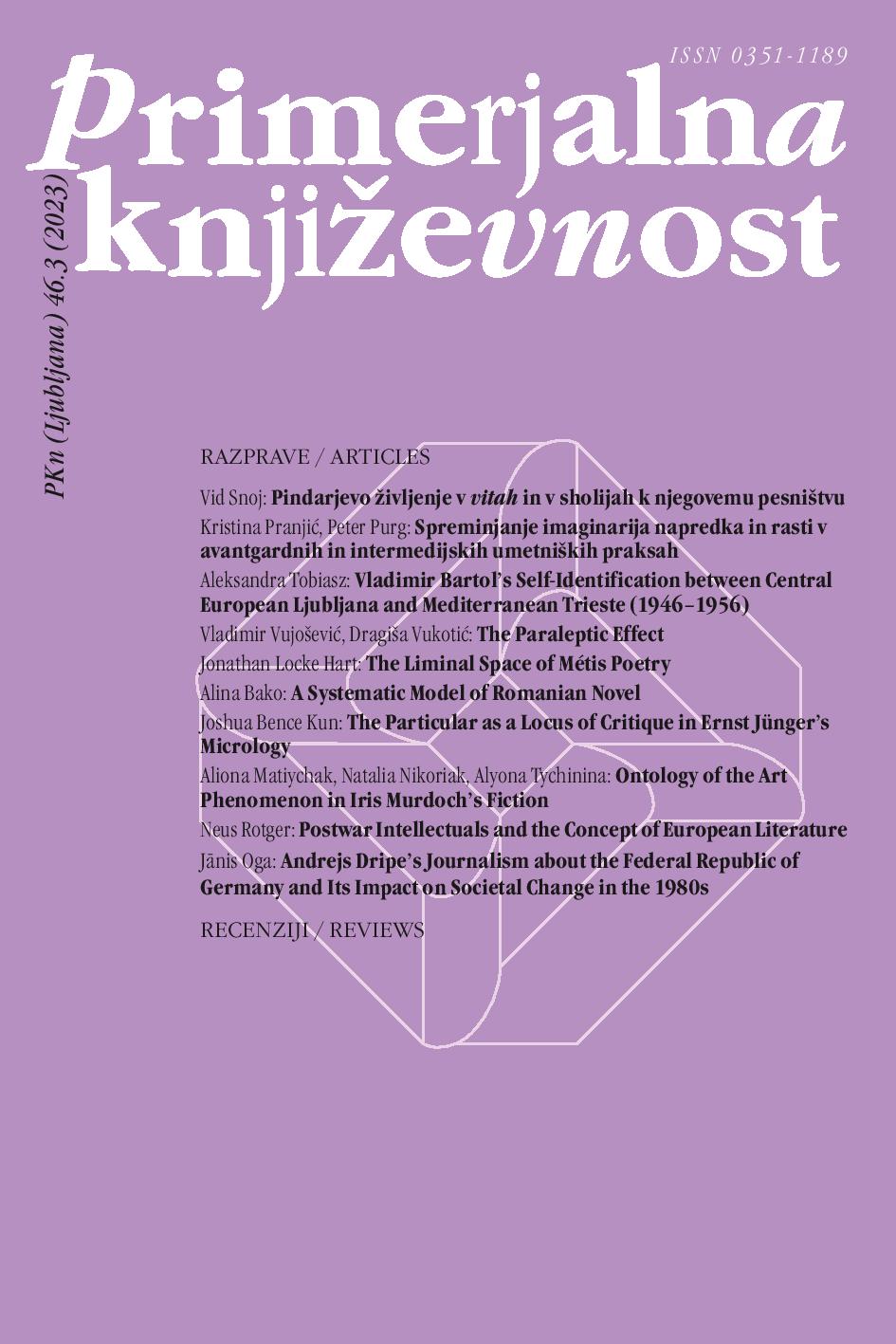Pindar’s Life in vitae and in Scholia to His Poetry
DOI:
https://doi.org/10.3986/pkn.v46.i3.01Keywords:
Greek poetry, Pindar, understanding of poetry, vitae of the poets, scholiaAbstract
In the canon of Greek lyric poets, Pindar was placed first by the librarians of Alexandria. He became the master lyricist, although he does not seem to be a model of metrical regularity in his songs in honor of the victors of the athletic games, the only part of his poetry that has survived almost intact. Moreover, even Pindar’s compatriots, despite their love of measure, calibration, and clarity, considered his poetic language obscure. He himself spoke of the need to interpret his poetry, or what it referred to. The interpretation of a poet’s work through his life, on the other hand, had already appeared among the Greeks. The linking of work and life began in the vitae, which, as far as the poets of the archaic period were concerned, were not written down until several centuries after their deaths and developed into a literary genre of their own. Given the scarcity of other material, the vitae in the case of the lyric poets rely mainly on their first-person statements. Their main feature, therefore, is the extraction of the life from the work, the portrait of the man suggested by the work itself. Pindar’s vitae thus foreground his piety. Biographisation, however, with its inevitable fictional gesture, is also found in scholiastic writing on Pindar’s poetry, which likewise originated in Alexandria. But the (in)found biographical information that effectively contributes to the construction of the anecdotal-legendary stories in the vitae is reversed in the scholia and becomes the key to unlocking the text.
References
Aristotel. Retorika. Prevod Matej Hriberšek. Ljubljana: Šola retorike Zupančič&Zupančič, 2011.
Currie, Bruno. Pindar and the Cult of Heroes. Oxford: Oxford University Press, 2005.
Currie, Bruno, in Ian Rutherford. »The Reception of Greek Lyric Poetry in the Ancient World: Transmission, Canonization, and Paratext«. The Reception of Greek Lyric Poetry in the Ancient World: Transmission, Canonization, and Paratext. Ur. Bruno Currie in Ian Rutherford. Leiden; Boston, MA: Brill, 2019. 1–36.
Dickey, Eleanor. »The Sources of Our Knowledge of Ancient Scholarship«. Brill’s Companion to Ancient Greek Scholarship. Zv. 2. Ur. Franco Montanari, Stephanos Matthaios in Antonios Rengakos. Leiden; Boston, MA: Brill, 2015. 459–514.
Diels, Hermann, in Walther Kranz, izd. Fragmenti predsokratikov 1–3. Prevod Dašo Benko idr. Ljubljana: Študentska založba, 2012.
Dornseiff, Franz. Pindars Stil. Berlin: Wiedmannsche Buchhandlung, 1921.
Drachmann, Aage B. Scholia vetera in Pindari carmina. Zv. 1: Scholia in Olympionicas. Leipzig: Teubner, 1903. Zv. 2: Scholia in Pythionicas. Leipzig: Teubner, 1910. Zv. 3: Scholia in Nemeonicas et Isthmionicas. Leipzig: Teubner, 1927.
Frankel, Hermann. »Schrullen in den Scholien zu Pindars Nemeen 7 und Olympien 3«. Hermes 4 (1961): 385–397.
Gallo, Italo, izd. Una nuova biografia di Pindaro (POxy. 2438). Salerno: Di Giacomo, 1968.
Greek Lyric. Stesichorus, Ibycus, Simonides, and Others III. Loeb 476. Grški izvirnik z angleškim prevodom. Cambridge, MA: Harvard University Press, 1991.
Hamilton, John T. Soliciting Darkness. Pindar, Obscurity, and the Classical Tradition. Cambridge, MA: Harvard University Press, 2003.
Heidegger, Martin. Der Spruch des Anaximander. Gesamtausgabe. Zv. 78. Izd. Ingeborg Schüssler. Frankfurt na Majni: Vittorio Klostermann, 2010.
Herodotus. Zgodbe. 2. izd. Prevod Anton Sovrè. Ljubljana: Slovenska matica, 2003.
Heziod. Teogonija / Dela in dnevi. Prevod Kajetan Gantar. Ljubljana: Modrijan, 2009.
Horace. Odes and Epodes. Loeb 33. Latinski izvirnik z angleškim prevodom. Cambridge, MA: Harvard University Press, 2004.
Irigoin, Jean. Histoire du texte de Pindar. Pariz: Klincksieck, 1952.
Kivilo, Maarit. Early Greek Poets’ Lives. The Shaping of the Tradition. Leiden; Boston, MA: Brill, 2010.
Lefkowitz, Mary R. »The Poet as Hero: Fifth-Century Autobiography and Subsequent Biographical Fiction«. The Classical Quarterly 2 (1978): 459–469.
Lefkowitz, Mary R. First-Person Fictions. Pindar’s Poetic »I«. Oxford: Clarendon Press, 1991.
Lefkowitz, Mary R. The Lives of the Greek Poets. 2. izd. Baltimore, MD: The Johns Hopkins University Press, 2012.
Lloyd-Jones, Hugh. »Modern Interpretation of Pindar: The Second Pythian and Seventh Nemean Odes«. The Journal of Hellenic Studies 93 (1973): 109–137.
Negri, Monica. »Commento«. Eustazio di Tessalonica. Introduzione al commentario a Pindaro. Izd. Monica Negri. Brescia: Paideia Editrice, 2000. 67–275.
Pausanias. Helládos periégesis. Complete Works. Dvojezična elektronska izdaja. Hastings: Delphi, 2014. 815–1527.
Pindar. Slavospevi in izbrani fragmenti. Prevod Brane Senegačnik. Ljubljana: Družina, 2013.
Race, William H. »The End of ‘Olympia’ 2: Pindar and the ‘Vulgus’«. California Studies in Classical Antiquity 12 (1979): 251–267.
Sapfo. Pesmi. Dvojezična izdaja. Prevod Marko Marinčič. Ljubljana: KUD Logos, 2008.
Snell, Bruno, in Herwig Maehler, izd. Pindari carmina cum fragmentis. Zv. 1: Epinicia. Leipzig: B. G. Teubner, 1980. Zv. 2: Fragmenta. Indices. Leipzig: B. G. Teubner, 1975.
Young, David C. »Pindaric Criticism«. The Minnesota Review 4 (1963–1964): 584–641.


